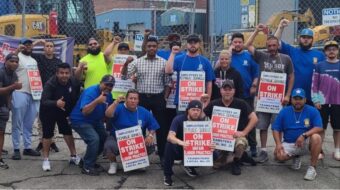
OAKLAND, Calif.—In a convoluted story that’s left dozens of indie music workers in limbo, workers at the artist-centric platform Bandcamp unionized with Office and Professional Employees Local 1010, and then (a) Bandcamp was sold to a new owner, SongTradr, which (b) fired half of the remaining workers, five months after the vote.
And a tweet from the Bandcamp United union says it was left, so far, with bargaining to try to lessen the financial hit on its members from the firings. SongTradr’s offer is six months severance pay, period, including two months mandated by federal law.
It also leaves the Bandcamp United union still pondering its next moves, including whether to file a second labor law-breaking—formally unfair labor practices—charge against the firm’s current and/or former owners, alleging retaliation.
The fired workers include the entire original eight-worker bargaining committee, which had begun talks with the prior owners on a first contract, one told People’s World in a telephone interview.
In the effects on bargaining, since Bandcamp isn’t shutting down, Local 1010 is demanding formal recognition of the union as the workers’ representative for those who remain. The original pro-union vote, on May 19, was 31-7, with 17 challenged ballots out of what was then a staff of 65. Recognition would let contract talks restart, even if they’re with bosses who just canned half of your colleagues.
On financial issues, the committee member added, the union is countering by demanding employment offers for all remaining workers and seeking “clear, consistent, and equitable voluntary severance offers” for the others, including more pay.
Seek better deal on healthcare
It also wants an additional month of company-offered COBRA health insurance—with workers paying the premiums–for the workers who were canned.
Telephone interviews with the bargaining committee member and the OPEIU staffer aiding the union reveal the tangled tale also actually strengthened worker-to-worker bonds in a time of trouble.
That trouble included who got fired: Not just the bargainers, but many workers of color. Most Bandcamp workers work remotely from the firm’s Oakland office. In one segment of workers who produce outstanding music for the artists who come to rely on Bandcamp, only one or two of workers of color, out of nine, were asked to stay on. “They weren’t taking into account the bias,” said the bargainer.
The union has filed one labor law-breaking—formally called unfair labor practices—charge against Epic with the San Francisco-Oakland office of the National Labor Relations Board. It hasn’t decided, yet, on whether to file another, alleging retaliation for pro-union activity, or against whom. Epic, the former owner of Bandcamp, is apparently still in the picture.
Epic, the former owner, is apparently still in the picture, though. So “we’re trying to figure out what to do next…We’re exploring a lot of different options,” besides effects bargaining, he says.
When it took over Bandcamp from Epic, SongTradr found itself “dealing with licensing problems, copyright problems and a lot of liabilities, including tax liabilities,” the bargainer said. Its solution was to cut the workforce.
“Epic probably discussed” with SongTradr “who they should hire” i.e. retain. They based those decisions, the bargainer said, “on performance indicators” and let go “those who had poor evaluations.” However, they didn’t discuss the indicators and evaluations with the union.
SongTradr didn’t hire support staff, either. Instead “they outsourced that function to people in the Ukraine,” he said. There’s been no word about whether or how the war there has disrupted that support staff.
The saga turned off at least one customer. “I was a small part of Bandcamp, both buying and creating music,” @creedy_paul tweeted. “But I have pulled all my work from the site and am less likely to buy from there now. I’m tired of nice things being bought up and gutted in the name of profit.”
The bargainer said workers are scrambling but also with “an incredible sense of solidarity” because they’re helping each other cope with the stress of where and when they’ll see a paycheck.
“There’s a lot of emotions in the process,” he said. “And we don’t want them”—the remaining workers at Bandcamp—“to wind up in six months in the place we’re in now.”
“This has been a really frustrating and fluctuating situation. But in building our union, there’s been a structure and support that we wouldn’t have otherwise. People have been willing to step up and take care of each other.”
We hope you appreciated this article. At People’s World, we believe news and information should be free and accessible to all, but we need your help. Our journalism is free of corporate influence and paywalls because we are totally reader-supported. Only you, our readers and supporters, make this possible. If you enjoy reading People’s World and the stories we bring you, please support our work by donating or becoming a monthly sustainer today. Thank you!










